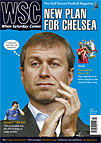 The traditional fanzine is making a comeback of sorts, writes Thom Gibbs
The traditional fanzine is making a comeback of sorts, writes Thom Gibbs
It is hard to miss Mike Harrison. Head to Valley Parade when Bradford City are at home and he’ll be standing outside wearing a retro Bantams shirt, clutching a wad of A5 fanzines. Oh, and he’s 6ft 8in. “It helps that I’m recognisable,” the editor of 24-year-old fanzine The City Gent says. “Most people know me, but I’m always badgering and cajoling new people to write and contribute, because if you don’t do that then you just won’t get anything.”
Mike and his fanzine have just won the League Two category in the Fanzine Awards, a new competition set up by the Football Fans Census and the New Football Pools. Ten zines were nominated for awards, in categories covering the Premier League through to League Two and the SPL, with a further five shortlisted for the non-League award. Sunderland’s A Love Supreme took the Premier League category and the prize for best overall fanzine, with other winners including Hartlepool’s Monkey Business in League One and QPR’s A Kick up the Rs for the Championship.
“Fanzines are a major part of football culture and we wanted to reward the wealth of talent, flair, and creativity which goes into them,” Tim Gentles, founder of the Football Fans Census, said. But with the internet eating away at their readership and significantly fewer fanzines being produced now than even five years ago, is there a danger that the zine is becoming a relic from a more innocent time?
“There is still a vibrant fanzine culture out there, with some very talented writers and a wide range of outstanding publications, but what really comes across is the passion and commitment of the contributors,” Gentles says, and surely every fanzine editor has a library of rainy-Tuesday-night-at-Saltergate horror stories to back up this point. Mike Harrison cites a downpour before a recent home game against Oxford, when the vast majority of Bradford’s 11,000 season-ticket holders elected to stay at home to watch the Champions League semis. “There aren’t that many lows, though,” he concedes. “I do get frustrated at times, but it’s nice to get validation from neutral people somewhere down in London who have been judging the fanzine and think, ‘Yeah, this is a really good one’. It’s still a buzz going to the printers to pick up a new issue.”
Although they appear to be in direct competition, the Fanzine Awards did not differentiate between printed zines and fan websites in its nominations. Although all of the league categories were won by predominantly print-based titles, the best editor award went to Jonathan Fear from the Vital Villa website, and best writer to Mickey Blue Eyes from Everton site Blue Kipper.
“We wanted the awards to be as inclusive as possible and we wanted to celebrate fanzine culture as it stands in the 2007-08 season, capturing the spirit, more than the medium,” Gentles adds. “Websites and blogs are certainly a continuation of the original culture and they’ll be central to its future.”
But Mike Harrison thinks print zines are experiencing a mini-revival, and makes a comparison with teenagers buying vinyl for its novelty and collectability value. “I was a bit disappointed to find out that the awards included websites as well, because I think they’re an entirely different animal,” he says. “The majority of people that buy City Gent file them away religiously. One of the nicest things about that is you can pick up a copy from a few years ago and it completely takes you back to that period – you know, why we were moaning about Colin Todd or whoever. I think that’s harder to do on the internet.”
If Harrison’s theory of a recovery for print fanzines isn’t entirely substantiated by the declining numbers, there’s no doubt that the Football Fans Census’ attempt to celebrate fanzine culture should be applauded. Regardless of whether websites continue to “replace” zines, the original printed format is worth preserving, because a quality zine reflects the football experience like nothing else: the minutiae; the obsession; the camaraderie. Aside from the parochialism and specific rituals of supporting your own club, these are things every supporter shares and understands.
From WSC 257 July 2008